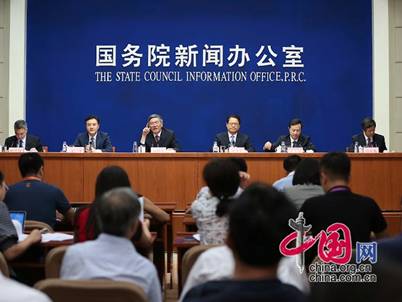
9月17日,国务院新闻办公室就生态文明体制改革总体方案等情况举行了新闻发布会,中央财经领导小组办公室副主任杨伟民、中共中央组织部秘书长高选民、环境保护部副部长翟青、审计署副审计长陈尘肇、国家统计局副局长许宪春介绍生态文明体制改革总体方案主要内容和相关配套文件等方面情况,并答记者问。
新闻发布会上,陈尘肇副审计长主要介绍了《关于开展领导干部自然资源资产离任审计的试点方案》的情况并回答了记者的现场提问。现将发言内容及答记者问文字实录转载如下:

女士们、先生们,下午好!
党的十八届三中全会《决定》提出,对领导干部实行自然资源资产离任审计。根据中央部署和分工,此项任务由审计署牵头,会同其他部门落实。我们理解,这项工作对于促进领导干部落实自然资源资产管理和环境保护责任,加强环境保护工作,推动生态文明建设具有重要意义,也是建立健全生态文明制度体系的重要内容。对领导干部实行自然资源资产离任审计,是一项全新的工作,没有成熟的经验,世界上其他国家也只是对自然资源和环境保护情况进行过审计。为完成好这项全新的任务,审计署组织了深入调研,全面总结了近些年开展自然资源和环境审计的实践经验,会同有关部门研究起草了《关于开展领导干部自然资源资产离任审计的试点方案》。主要目标,就是要通过审计试点,进一步明确审计对象、审计内容、评价标准、责任界定、审计结果运用等事项,形成一套比较成熟、符合实际的审计操作规范,探索并逐步建立完善领导干部自然资源资产离任审计制度。这次试点方案提出三个原则,即因地制宜、重在责任、稳步推进的原则。全国各级审计机关将根据各地自然资源资产的禀赋特点和生态环境保护工作重点,有针对性地组织审计试点工作。
下一步,我们将积极推进试点工作,与有关部门协作配合,为促进领导干部守法、守纪、守规、尽责,促进生态文明建设作出更大贡献。作为世界审计组织主席和亚洲审计组织环境审计委员会主席,中国审计署也将继续推动世界各国最高审计机关加强自然资源资产和环境保护相关审计工作,为保护地球做出更多努力。谢谢大家!
中国日报记者:领导干部自然资源资产离任审计最核心的内容是什么?可否用一个关键词来总结?另外,是否可以介绍一下审计署在加强资源环境审计方面做了哪些工作?
陈尘肇:谢谢你的提问,我觉得对领导干部实行自然资源离任审计,最核心的内容就是明确责任、界定责任,我理解可以从为什么审、审什么、审计结果怎么用这三个方面来看问题:
第一个方面,为什么要开展这项审计?也是从宏观层面来看,开展这项审计的目的是为了促进领导干部更好地履行自然资源资产管理责任和生态环境保护责任,推动建立健全领导干部政绩考核体系,推动领导干部树立科学的政绩观和发展观,防止只管经济发展,不管资源的节约集约和有效利用,不管环境保护,进而促进整个生态文明建设。
第二个方面,到底审什么内容?从审计的组织实施来看,我们对领导干部的任职前后,区域内自然资源资产实物量变动情况进行重点审计,对重要环境保护领域也要进行重点审计。审计中客观分析变动的原因是什么,哪些是客观原因,哪些是主观原因。对人为因素造成自然资源资产数量减少的、质量下降的、环境恶化的、污染比较严重的这些问题,要实事求是地界定领导干部应承担的责任。
第三个方面,审计结果怎么用?我们将会把审计报告送给干部管理部门,如审计署的审计报告将会给中组部、中纪委等,如果涉嫌犯罪的,还要移交给司法机关。审计结果将对落实责任、问责追责,对干部的使用、任免和奖惩,提供重要依据或者基础。
第二个问题,给大家介绍一下审计署这些年在加强资源环境审计方面所做的探索。审计署高度重视对资源环境保护情况进行审计监督。近年来我们依法开展了对土地和矿产资源的管理情况、对节能减排和环境保护政策的落实情况,还有重点流域水污染的防治等进行了专项审计,涉及到水、土地、矿产、森林、海洋、草原等多种重要资源,以及废弃物的处置、生态环境的保护、节能减排等多个领域。同时,在领导干部经济责任审计中,也把资源利用和生态环境保护情况作为重要审计内容,并且关注了与领导干部履行经济责任有关的管理、决策等活动的环境效益情况。可以说,领导干部自然资源资产离任审计与经济责任审计是双管齐下,一方面通过经济责任审计,促进建设好“金山银山”,另一方面通过自然资源资产离任审计,促进建设好“绿水青山”。
从这些年来的审计结果来看,资源环境审计在防止资源破坏和环境污染等方面发挥了积极作用,成为促进资源环境保护工作的有效力量。我们相信,认真贯彻落实党的十八届三中全会的要求,开展领导干部自然资源资产离任审计,对加快推进生态文明建设、推进生态文明体制改革具有重要作用,对提高审计工作自身的能力和水平也有重要意义。
同时,中国审计署也积极推动世界各国环境审计工作的发展。从2000年开始,中国审计署先后担任了亚洲审计组织环境审计委员会主席和世界审计组织环境工作组的指导委员,我们多次组织和举办培训班和研讨班,组织和参加国际环境的审计工作会议,推动环境审计的国际交流。特别是2013年开始,中国审计署担任了世界审计组织的主席国,大力推动各国的最高审计机关加强对可持续发展和环境保护的审计,为世界环境保护工作做出更大的贡献。谢谢!
附件:关于领导干部自然资源资产离任审计试点的背景材料
国务院新闻办公室新闻发布会材料四
关于领导干部自然资源资产离任审计试点的背景材料
(2015年9月17日)
审计署
中国共产党十八届三中全会《决定》提出,对领导干部实行自然资源资产离任审计,作为加强生态文明建设的一项重要改革举措。根据中央部署和分工,审计署牵头负责落实此项任务,会同有关部门研究起草了《关于开展领导干部自然资源资产离任审计的试点方案》(以下简称《试点方案》)。具体情况如下:
一、近年来资源环境审计工作的基本情况
审计署高度重视对资源环境保护情况的审计监督,近年来,先后依法开展了对土地和矿产等资源管理、节能减排和环境保护政策落实、水污染防治等多项审计,涉及水、土地、矿产、森林、海洋等多种重要资源和废弃物处置、生态环境保护、节能减排等多个领域;在领导干部经济责任审计中,把资源利用和环境保护情况作为重要审计内容,并且关注了与领导干部履行经济责任有关的管理、决策等活动的环境效益情况。这些审计结果表明,资源环境审计在防止资源破坏和环境污染等方面发挥了积极作用,正日益成为促进资源环境保护工作的有效力量。认真贯彻落实党的十八届三中全会要求,开展领导干部自然资源资产离任审计,对加快推进生态文明建设、推进生态文明体制改革具有重要作用,对提高审计工作的能力和水平也具有重要意义。
同时,中国审计署还积极推动世界各国环境审计工作的发展。从2000年开始,中国审计署先后担任亚洲审计组织环境审计委员会主席和世界审计组织环境工作组指导委员,多次组织和举办培训班、研讨班,组织和参加国际环境审计工作会议,推动环境审计的国际交流。特别是2013年起中国审计署担任世界审计组织主席国,大力推动世界各国最高审计机关加强对可持续发展及环境保护的审计,为世界环境保护工作做出更大贡献。
二、《试点方案》的起草情况
对领导干部实行自然资源资产离任审计,是一项全新的改革任务,没有成熟的经验。为推动工作规范开展,审计署组织了深入调研,会同发展改革委、财政部、国土资源部、环境保护部、水利部、农业部、统计局、林业局等部门研究起草了《试点方案》。起草《试点方案》的基础主要有:一是深入总结了近些年审计署开展资源环境审计工作的实践经验,包括土地、矿产、林业、草原、海洋、水资源开发利用保护和水污染防治、节能减排、资源能源节约利用专项资金等专项审计情况。二是参考《党政主要领导干部和国有企业领导人员经济责任审计规定》及其实施细则等规范性文件,借鉴其开展“自然资源资产的开发利用和保护、生态环境保护”审计的成熟做法。三是梳理自2014年起先期开展领导干部自然资源资产离任审计试点的地方审计机关的情况,特别是试点中遇到的困难及需要明确的一些问题,如审计对象、审计内容、审计方式等,进行了专题研究,在此试点方案中尽可能予以明确和规范。
三、开展领导干部自然资源资产离任审计的指导思想
按照中央有关精神和要求,开展领导干部自然资源资产离任审计的指导思想是:认真贯彻落实党的十八大、十八届三中、四中全会精神,以邓小平理论、“三个代表”重要思想、科学发展观为指导,深入贯彻习近平总书记系列重要讲话精神,紧密结合自然资源资产开发利用和生态环境保护的实际,围绕领导干部履行自然资源资产管理和生态环境保护责任情况开展审计,促进领导干部树立科学的发展观和正确的政绩观,推动生态文明建设。
四、开展领导干部自然资源资产离任审计的步骤
此项审计实行试点先行、有序推进,大致分为3个阶段分步骤实施:
一是2015年启动审计试点,制定《关于开展领导干部自然资源资产离任审计的试点方案》;
二是2016年扩大试点范围,审计署统一组织指导部分地方审计机关开展审计试点;
三是2017年全面开展试点审计,制定《领导干部自然资源资产离任审计暂行规定》;
从2018年开始,各级审计机关按照干部管理权限受组织部门委托组织开展离任审计,形成经常性审计制度。
其中2015年至2016年的审计试点任务是,审计署组织在部分地区实施审计试点,地方审计机关根据实际情况安排当地审计试点项目,由省级审计机关统一组织实施。《试点方案》强调,在两年的审计试点中,审计署要加强经验总结,在审计内容、审计技术方法、审计评价、审计责任认定、审计结果运用等方面,探索并逐步形成一套比较成熟、符合实际的审计工作规范,为建立经常性的审计制度奠定基础。
五、开展领导干部自然资源资产离任审计的方式和重点
《试点方案》指出,开展领导干部自然资源资产离任审计试点,应坚持因地制宜、稳步推进原则,即根据各地自然资源资产禀赋特点和生态环境保护工作重点,确定审计内容和重点,有针对性地组织实施;坚持重在责任原则,即要以自然资源资产负债表反映的自然资源资产实物量(包括数量与质量)和生态环境质量状况变化为抓手,对领导干部履行自然资源资产管理和生态环境保护责任情况进行评价,重在界定领导干部应承担的责任;坚持及时总结原则,即边试点边总结边推广,将实践经验提炼成可固化的审计技术方法。
试点审计的主要对象是地方各级党委、政府主要领导干部,审计试点涉及的重点领域包括土地资源、水资源、森林资源,以及矿山生态环境治理、大气污染防治等领域,重点针对被审计领导干部任职期间履行自然资源资产管理和生态环境保护责任情况开展审计。
六、开展领导干部自然资源资产离任审计的组织领导
这项审计试点工作在很大程度上要以主管部门的资源及环境指标体系为基础,审计通过必要的技术方法进行核实,依法准确界定责任,全面客观作出评价。因此,需要尽快开展编制自然资源资产负债表试点,建立和完善自然资源资产产权制度、自然资源资产管理和监管制度、主体功能区和国土空间开发制度、生态环境损害责任追究制度、生态环境损害赔偿制度等,积极推进完善自然资源资产登记制度、自然资源资产保护目标责任制度等,建立自然资源资产管理保护考核评价标准,为全面开展领导干部自然资源资产离任审计提供基础。为此,《试点方案》提出:
一是审计署作为牵头部门,将加强对领导干部自然资源资产离任审计试点的统筹规划,切实做好分类指导和专业培训,加强调查研究,统筹协调解决试点中遇到的困难和问题。
二是发展改革委、财政部、国土资源部、环境保护部、水利部、农业部、统计局和林业局等参与部门要加强对此项审计的支持和配合,加快推进有关改革,为试点工作提供专业支持和制度保障。
三是地方党委和政府要加强对本地区试点工作的领导,及时听取本级审计机关试点工作情况汇报,推进试点工作开展,还要主动接受、配合上级审计机关审计,组织部门要加强对试点工作的支持,保障审计试点工作的顺利开展。
《试点方案》的出台,将为建立健全生态文明制度体系提供重要支撑,促进各级领导干部更好地履行自然资源资产管理和生态环境保护责任,为推动生态文明建设发挥积极作用。
Material No.4 for the Press Conference of The State Council Information Office
Background information on pilot audit of outgoing leading officials’ natural resources/assets accountability
17th September 2015
prepared by National Audit Office
The Decision adopted by the Third Plenary Session of the 18th Central Committee of the Communist Party of China stated audit of outgoing leading officials’ natural resources/assets accountability should be conducted as an important reform measure to promote ecological progress. According to the arrangement of the Central Committee, the National Audit Office (CNAO) is responsible for leading the implementation of this task, and, together with relevant departments, jointly drafted the “Pilot Plan on Implementing Audit of Outgoing Leading Officials’ Natural Resources/Assets Accountability”, hereinafter referred to as the Pilot Plan. Details are as follows:
I. The general status of resources and environmental auditing in recent years
The CNAO attaches great importance to the audit of natural resources and environmental protection, and carried out, in recent years, audits of land and mineral resources management, audits of the implementation of energy conservation and emission reduction policies and environmental protection policies, as well as audits of water pollution prevention measures. These audits involve various important natural resources like water, land, minerals, forests, seas and oceans, and cover various aspects including waste disposal, ecological protection, energy conservation and emission reduction. In the accountability audits of leading officials, the use of natural resources and the protection of environment are important contents of audit. Due attention was given to the environmental performances of managing and decision making activities related to leading officials’ accountability fulfillment. These audit results showed that natural resources and environment auditing has played an active role in preventing damage of natural resources and environmental pollution, and is becoming an efficient measure in promoting natural resources and environmental protection. Faithfully implementing the decisions of the 3rd plenary session of the 18th Central Committee of the Communist Party of China, and carrying out audit of outgoing leading officials’ natural resources accountability, are very important to enhance ecological progress and promote ecological environment management reform, so as to increase the capacity and value of audit.
In the mean time, the CNAO has been actively promoting the development of environmental auditing worldwide. Since 2000, the CNAO has taken up the responsibilities as the Chair of the Environmental Auditing Committee of the Asian Organization of Supreme Audit Institutions (ASOSAI) and the member of the Steering Committee of the Working Group on Environmental Auditing (WGEA) of the International Organization of Supreme Audit Institutions (INTOSAI), and has been pushing ahead international communications on environmental auditing through hosting and organizing a lot of workshops and seminars, as well as participating in and organizing international conferences on environmental auditing. Especially since 2013, when the CNAO assumed the chairmanship of INTOSAI Governing Board, the CNAO has encouraged supreme audit institutions worldwide to strengthen their audits of sustainable development and environmental protection, making greater contributions to environmental protection worldwide.
II. The drafting status of the Pilot Plan
The audit of outgoing leading officials' natural resources/assets accountability is a completely new task of reform with no established experiences for reference. In order to implement the audit in an orderly way, the CNAO carried out thorough surveys and researches, and jointly prepared the Pilot Plan with the National Development and Reform Commission, Ministry of Finance, Ministry of Land and Resources, Ministry of Environmental Protection, Ministry of Water Resources, Ministry of Agriculture, National Bureau of Statistics, and State Forestry Administration. The Pilot Plan was drafted on the basis of: 1) practical experiences drawn from the natural resources and environmental audits conducted by the CNAO in recent years, including the audits of earmarked funds for the purposes of exploitation, utilization and protection of lands, minerals, forest, grasslands, maritime and water resources, as well as the audits of the funds for water pollution prevention, energy conservation and emission reduction, and efficient utilization of resources and energy; 2) making references to the regulatory documents of "Regulations for Accountability Audit of Principal Leading Cadres of the Party, the Government and State-Owned Enterprises" and their implementation rules, and assimilating its established practices on audits of the exploitation, utilization and protection of natural resources/assets, and audits of ecology protection; 3) summarizing experiences from the experimental audits of outgoing leading officials' natural resources/assets accountability, which have been carried out since 2014. The difficulties met in the experimental audit and issues to be clarified, for example, the subject, content and methodology of audit, are clarified and regulated in the Pilot Plan.
III. The guidance of the audit of outgoing leading officials' natural resources/assets accountability
In line with the relevant central government principles and requests, the guidance of the audit of outgoing leading official's natural resources/assets accountability is: faithfully implement the principles of the 18th National Congress of the Communist Party of China, as well as its 3rd and 4th plenary sessions, follow the guidance of Deng Xiaoping Thoery, the important thought of the Three Represents and the Scientific Outlook on Development, and deeply implement the essence of the series key speeches made by General Secretary Xi Jinping, deeply considering the actual situation of natural resources/assets exploitation and utilization, and ecological and environmental protection, conduct audits focusing on leading officials' accountability for natural resources/assets management and ecological and environmental protection, so as to encourage leading officials forging reasonable outlook on development and correct view on administrative performance, and to promote ecological development.
IV. The procedures of carrying out audit of outgoing leading officials' natural resources/assets accountability
The audits will start with pilot projects and will be implemented in due orders. The pilot stage covers 3 phases:
First phase, the launch of pilot audits, and adoption of “Pilot Plan on Implementing Audit of Outgoing Leading Officials’ Natural Resources/Assets Accountability” in 2015;
Second phase, expanding the scale of pilot audit, the CNAO will organize and guide some local audit institutions to conduct pilot audit projects in 2016;
Third phase, pilot audits will be in full scale in 2017, and "Provisional Regulations on Audit of Outgoing Leading Officials’ Natural Resources/Assets Accountability" will be prepared and adopted;
From 2018, entrusted by the Party organization departments, audit institutions of all levels will conduct audit of outgoing leading officials according to the mandate of personnel management, and make it a routine audit.
For the year 2015 and 2016, the task of pilot audits will be: the CNAO will carry out audits in some regions; organized and implemented by provincial audit institutions, local audit institutions will choose some pilot audits based on their actual context. The Pilot Plan points out that in the two-year piloting audit period, the CNAO should strengthen experiences learning, explore and establish a set of mature, applicable working regulations on audit contents, audit techniques and methods, audit assessment, holding to account, as well as the use of audit results, so as to lay a foundation for establishing a routine audit system.
V. The mode and focus of audit of outgoing leading officials’ natural resources/assets accountability
The pilot plan states that some principles should be followed in the conduct of audit of outgoing leading officials’ natural resources/assets accountability as follows:
-- adaption to local condition and steady progress: The contents and focus of audit should be determined according to both the characteristics of natural resources/assets endowment and priority of ecological environment protection in various regions so as to ensure audits are well-targeted.
-- emphasis is to hold to account: The physical output (both quantity and quality) of natural resources/assets as reflected in the balance sheet as well as the status of environmental quality should be an important basis to evaluate the performance of accountability of leading officials for natural resources/assets management and environmental protection. The emphasis should be placed to holding to account.
-- Learning from the experiences timely: The experiences should be summed up and further disseminated in a timely manner along with the pilot process, and develop audit methodology based on practical experiences.
The main objects of the pilot audit are leading officials of the Party and local governments at various levels. Key areas cover the resources of land, water and forest, the ecological management of mines, the prevention and control of air pollution, etc. The focus of the audit should be the leading officials' accountability for the management of natural resources/assets and ecological environmental protection during their tenure of office.
VI. The organization and leadership of the audit of leading officials' accountability for natural resources/assets
By large, the pilot audit should be based on the indicator system on resources and environment developed by competent authorities by which the auditors conduct the verification through relevant methodologies and holding to account according to the law, and make evaluations in a comprehensive and objective manner. In this regard, some necessary tasks need to be carried out as soon as possible before the conduct of audit of leading officials' accountability for natural resources/assets in a comprehensive way, including: pilot compilation of balance sheet on natural resources/assets; establishment and improvement of systems on property right of natural resources/assets, administration and supervision of natural resources/assets, establishment of Main Function Areas and land spatial development systems, accountability for ecological environmental damages and the corresponding compensation practices; the improvement of systems for the registration and protection objective responsibility of natural resources/assets; and building of evaluation criterion for the administration and protection of natural resources/assets. For this purpose, the Pilot Plan points out:
-- the CNAO, as the leading department, should strengthen the overall planning of the pilot audit of leading officials' accountability for natural resources/assets, conduct targeted guidance and professional training effectively, enhance the investigation and researches, and solve the problems and difficulties encountered during in the process of pilot audit in a coordinated manner.
-- the National Development and Reform Commission, Ministry of Finance, Ministry of Land and Resources, Ministry of Environmental Protection, Ministry of Water Resources, Ministry of Agriculture, Bureau of Statistics, Bureau of Forestry, and other participating departments should intensify their support and collaboration with the audit, speed up relevant reforms, and provide professional assistance and institutional guarantee to the pilot audit.
-- The Party and local governments at various levels should reinforce the leadership of the pilot audit in their respective region, timely hear the report on the pilot audit from local audit institutions, promote the smooth progress of the pilot audit, accept and cooperate with the audit conducted by audit institutions at higher levels. The Party organization departments should strengthen the necessary support to guarantee the smooth implementation of the pilot audit.
The publication of the Pilot Plan will offer important support to the building and improvement of the systems of ecological civilization, held to ensure the leading officials at various levels to better perform their accountability for natural resources/assets administration and ecological environmental protection, and make positive contribution for the development of ecological progress.
| 【关闭】 【打印】 |










